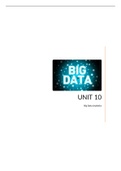UNIT 10
Big Data Analytics
,Contents
INTRODUCTION.....................................................................................................................................2
1. The reasons why organisations analyse data, including strategic planning, improving productivity
and product and/or service benchmarking............................................................................................2
2. General challenges of analysing data including costs, skills required and security issues.................4
3. The ethical and legislate factors that govern the gathering, access and storage of data...................5
4. Types of data and sources available including qualitative, quantitative, internal and external data. 7
5. Storing data including structured and unstructured data, system-based factors and security..........9
6. Data warehouses and Data marts......................................................................................................9
Data Lake.......................................................................................................................................9
Data Warehouses.........................................................................................................................10
Data Marts...................................................................................................................................10
7. Analysing big data and the challenges involved including the skills and technology needed..........10
8. The different types of business analytics (descriptive, diagnostic, predictive, prescriptive)............11
9. The benefits and challenges to organisations that may arise from the collection, storage and
analysis of organisational data, with particular reference to big data.................................................12
M1. Compare how an organisation can use analytics to improve performance, benchmark and/or
innovate...............................................................................................................................................12
D1. Evaluation......................................................................................................................................13
References...........................................................................................................................................15
1
, INTRODUCTION
In this report,
I will be discussing the role of big data and business analytics too improve performance, for
benchmarking and/or to trigger innovation in organisations.
Big Data are very large data sets that are difficult to process or analyse using typical
software tools such as databases in a reasonable amount of time. Big Data is gotten from
various sources such as traffic flow sensors, satellite imagery, banking transactions, website
activity logs, and financial market data. Big Data is known to have various qualities such as
its variety, volume or velocity. The rapid development of new technologies like the IOT
(internet of things) and (AI) artificial intelligence are used to aid the big data development.
Some popularly known companies that use Big Data are Netflix, Amazon, and Airbnb .
1. The reasons why organisations analyse data, including strategic planning,
improving productivity and product and/or service benchmarking
When big data is effectively utilized, organisations are able to improve campaign
performance, streamline operations, and increase consumer loyalty. Some of the reasons
why businesses analyse big data and how it affects marketing:
1. Customer Acquisition and Retention: To sell their products, the organisation must
take a distinctive strategy. Companies can determine precisely their
clients/customers need by utilising big data. Consumer trends are monitored using
big data methods. The organisation then collects additional data to reveal latest
trends and plans to keep customers satisfied and take advantage of those strategies
to inspire brand loyalty.
2. Focused Marketing Campaigns: Big data may be used by organisations to give
customised products to their target customers. Big Data enables businesses to
perform in-depth research of customer behaviour which includes online
transactions. These analysis helps businesses to successfully develop a more focused
and targeted campaigns, surpassing their client expectations.
2





